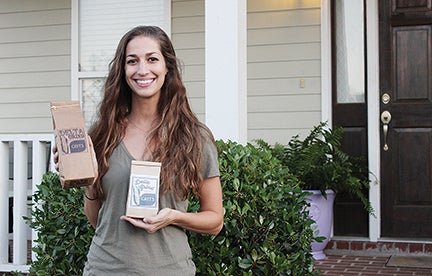New owner keeps Delta Grind in the family
Published 12:00 pm Saturday, June 4, 2016
BY VICTORIA MEKUS
news@oxfordeagle.com
Manual labor, personal deliveries, and the ability to ensure efficiency and quality simultaneously. The decision to become a business owner can be an intimidating one. However, Oxford native Julia Tatum, 25, is up for the challenge.
Established in 2001, Julia’s cousin Becky Tatum purchased Delta Grind in 2008 and grew the business to provide grits for over 50 businesses and restaurants across the country. With two young children, Becky Tatum decided to sell her company in early 2016 to spend more time with family. The Tatum name is well-known in Oxford as one of the oldest families in the city. After a series of changes in the past year, including the loss of Tatum matriarch, Dorothy Lee Tatum, who owned the historic home Ammadelle, Julia Tatum decided to buy her cousin’s business.
“I have a hard time letting go of things,” Julia said. “I want everything to stay the same and stay in the fam- ily. So when I found out Becky was selling, I wasn’t sure if she would take me seriously at first, because my brother and I are the babies of the family, but I just started asking a lot of questions.”
Coming from a family that places high importance on tradition, Julia Tatum said she doesn’t think there is anything more traditional than a family meal. Her senior thesis at the University of Mississippi was about family dinners at Ammadelle.
“With my love of food and Southern comfort, I just really felt like this was something I could do and enjoy doing,” she said. “There’s something really satisfying about making something by hand, and seeing the finished product, and being able to hold it and see it do so well.”
Julia Tatum’s passion for the industry is also nostalgic in other ways. Her maternal great uncle, known as “Unc” or “Big Daddy,” owned a large farm called Clifton Farms that is still managed by her cousins.
“We grew up spending weekends there with my mom,” she said. “She grew up running through the fields of corn, which you can see for miles, and riding horses. I learned to drive by following the path along the crops to the old shack my great-grandparents built. My brother and I would play hide and seek when the crops were up in the big field by the cabin after a day of fishing.”
Tatum said she was nervous the past few months before taking over the company, which is the biggest undertaking she has faced. However, the sentimental connections and overwhelming support from friends and family have given her the courage needed to succeed.
The Mill
“Make sure you don’t wear anything black,” Tatum warned before making the trip to the Delta Grind mill in Water Valley. “If you wear something black, I promise, it won’t be black by the time we leave.”
The warehouse is located a quick 15-minute drive from Oxford to Water Valley. Behind a roll-up door at the back, Julia does the “daily grind.”
Large industrial machines take up only a small part of the spacious, open room. There were many bags on the floor that hold 100 percent, all natural, Mississippi corn from farms throughout the state.
“I grind to order, so I don’t have it stocked up,” said Julia Tatum. “I only make what is needed, and then hand-deliver or ship the next day to ensure freshness.”
This is a selling point that differentiates Delta Grind from larger companies. Tatum said customers cannot know how long grits from many corporate household names have been stored. This is also because many mills use a different kind of system.
“While most mills today are still water-powered, making them a seasonal commodity, my mills are electric-powered, allowing me to produce year- round,” Tatum said.
Tatum said her grits are milled with stone, which does not par-cook the product. Big-name, store-bought grits are usually produced in steel mills. Steel heats up and par-cooks the grits, making them quicker to cook. This process takes some of the nutrients out, she said.
Another key element of Delta Grind is eliminating any sort of waste. “All of our packaging is tamper-free, double bagged, biodegradable packaging, from the paper and string to any branding on the bags,” she said. “Nothing gets wasted in the factory. The byproduct, extra masa cornmeal, is used for animal feed and other things like that.”
These tedious methods, along with extreme attention to detail, are a small part of the actions needed to produce products served and sold at businesses such as Whole Foods and Babalu.
The machines hum and churn as kernels of corn drop into the mill and make their way to the separator. Three buckets sit on the ground underneath the machine, and grits, polenta, masa and “waste,” like the seed coating and bit of stalk and cob, are divided.
The buckets are sifted through to make sure no unnecessary pieces somehow end up in the wrong place, and are then hand-scooped into their respective bags and weighed.
“By the FDA rules and regulations, it’s got to be exactly what it says on the bag,” said Tatum. “They can come into the store, and measure your bag, and pull it off the shelf immediately if it’s not the exact weight that it says.”
This is a long process that has taken some getting used to, but being meticulous while producing the product is something Tatum believes distinguishes her business from others.
The rebranding
Though Delta Grind is under new ownership with Julia Tatum, the process and product will not change. Aside from a few machinery upgrades and an address change, the business has stayed true to its roots – a small, friendly, trusted, family establishment producing an all-natural quality product.
There will, however, be a few upcoming changes within the branding and packaging. As a graphic designer, Tatum has already changed the look of the logo and collateral.
Her home is now filled with bags, stickers and many other Delta Grind-themed ideas and materials, all stacked around the desk that she works from in her bedroom. It all flows with an alignment to family, tradition and creativity.
“I’m ready to see how far I can take Delta Grind and, in return, where it will take me,” Tatum said. “This is a learning experience, and I’m excited to see what’s in store.”






